Tishrei 6 marks the anniversary of passing of Rebbetzin Chana Schneerson, mother of the Rebbe, Rabbi Menachem M. Schneersohn, of righteous memory.
Known for her kindness and compassion, she led humanitarian efforts to feed and house needy refugees during the First World War and was a bastion of support for her community. A wise and learned woman, she joined her husband, the famed kabbalist Rabbi Levi Yitzchak Schneerson, in his courageous struggle against the Soviet suppression of religion.
In her later years, after her husband’s passing, she escaped from the Soviet Union and joined her son, the Rebbe, in New York. A rich and descriptive Yiddish writer, she wrote a diary, in which she records many events from her life, particularly the years she and her husband led the Jewish community of Yekaterinoslav (now Dnipro).
Here, we have collected some touching vignettes (translated into English) from Rebbetzin Chana’s diary in which she describes their struggle to maintain Judaism in the Soviet Union, and the difficulty she endured during her husband’s arrest and subsequent exile.
1. A Midnight Wedding
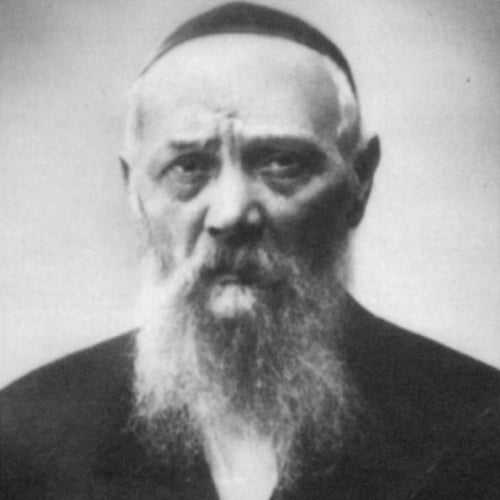
Once, at 11:00 o’clock at night, a woman visited us. After looking around to make sure no stranger was present, she addressed my husband in hushed tones:
“Rabbi, I have come to you from a distant city—its name I won’t tell you. In about an hour, at midnight, my daughter will be coming with a young man. They both hold such important positions that their coming here puts them in true danger. After my entreaties and tears, they promised to agree to a Jewish wedding ceremony, but only if you will officiate; under no circumstances will they do it with anyone else.”
At 12:00 o’clock, the two arrived, the daughter having covered her face so she would not be visible. I immediately led them both into my husband’s office so that no one would notice them.
It was at this point that my husband began his preparations. First, he insisted on having a minyan, without which he would not perform the wedding. Besides my husband and the groom, we needed eight more men who “would see but not be seen,” and trusted, one hundred percent, that they would not later inform on anyone.
Within half an hour, this was accomplished, except for a tenth man, who was missing. My husband sent for the building supervisor, who was Jewish and belonged to the young generation ….
Startled, the supervisor gave my husband an astonished look. “Me?!” he asked incredulously. But he immediately went to the window and closed the shutters firmly, locked the door and took a seat.
2. Post-Yom Kippur Festivities
When my husband would return home after Yom Kippur, he couldn’t easily settle back into the everyday mundane existence. After coming home quite late in the evening, he drank only a glass of tea. Then he remained sitting, still garbed in his kittel and the gartel of his great-great-grandfather, the Tzemach Tzedek, to lead a farbrengen until two or three o’clock in the morning.
This was his regular custom on the evening after Yom Kippur, both when Jewish life had been less constricted and later when Judaism could be practiced almost solely within the confines of one’s own home.
Some of our friends were aware of my husband’s custom, and they would eat a quick evening meal with their families before coming to our home. My husband would deliver a Chasidic discourse on subjects connected with the Yom Kippur prayers. In later years he spoke about the great qualities of Jews, their self-sacrifice to observe Judaism, and how they expressed their love towards other Jews in that difficult era.
Ten or fifteen people always attended this farbrengen, which included dancing as enthusiastic as on Simchat Torah.
3. A Wedding Celebration
It was 1928. Anti-religious propaganda was extremely intense, although several synagogues and a Jewish religious community still existed [in Dnepropetrovsk]. By that time, [even independent] left-wing parties no longer existed.
The authorities had already confiscated half of our apartment, leaving us only three rooms. The larger portion of the apartment, of course, was given to the new neighbors.
Although the groom and bride [my son and daughter-in-law] were not with us, we wanted to celebrate on that day. … Keep in mind that this took place at a time when any contact with clergymen was forbidden, and such a crime could cost one their job.
For two days, special permission was given to receive telegrams in Hebrew [in transliteration]—a language already strictly banned. We, of course, also wrote and received letters in Hebrew. ….
According to our calculations, not even thirty people were likely to attend our celebration. But it inspired our region’s Jewish communities to the extent that three hundred guests actually came to celebrate … As day broke, everyone left to their daytime jobs. My husband’s inspiration had transported them to a different world. No one wanted to consider what price they might pay for showing us such friendship and participating in the celebration.
4. The Poet and the Rabbi
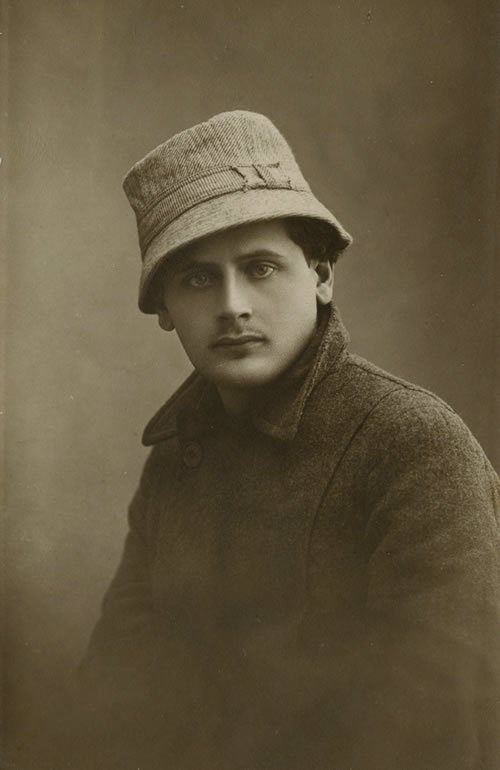
In 1937, Peretz Markish’s father passed away in our hometown, Dnepropetrovsk. He was Torah learned and would regularly visit our home. Before his passing, he left instructions that his burial be conducted in accordance with Rabbi Schneerson’s directives.
Since his father was religious, Markish did not interfere in the burial proceedings, and didn’t want it to be known that he was present in Dnepropetrovsk. Instead, he sent his sister, who was also a Communist party member, together with another sister in whose home their father had lived, with a message to my husband.
He wanted my husband to know that, although he couldn’t meet with him personally, the Rav should be aware that regardless of Markish’s personal ideology and prominent position, he held Rabbi Schneerson in the highest esteem and related to him with the greatest personal respect. This was based on his own experience and on his father’s frequent letters to him, which made a deep impression on him.
Markish communicated everything regarding his father through his sister, the secretary. But he asked that it be kept as quiet as possible.
All details of the burial, which was also in a favorable plot, were performed in the finest possible manner relative to the conditions of that time. The family donated large sums for the city’s clandestine Torah schools for children and the like, which were conducted at great personal peril to those involved.
The writer and the secretary left town the night after the funeral, and no one else in town was aware of their visit.
5. Spies at the Rabbi’s House
On Purim, a large crowd celebrated in our home until six o’clock in the morning. Besides for the older people, there were a good number of young people, including several university students for whom it was absolutely forbidden to be present at such a gathering. My husband delivered many Torah discourses with great passion, and the crowd was filled with joy and with feelings of devotion to him. There was also dancing—something which people were afraid to even think of in those days.
For some reason, this time it was difficult for them to part from my husband. Later it occurred to me that they may have had a premonition that this was the last time they were spending with him.
When they finally left the house, they did not all leave at once but, rather, two or three at a time, in order not to attract attention.
When I went outside, I saw the two scoundrels loitering on the street. The day after the arrest, they disappeared. Indeed, they must have been assigned to observe the goings-on at our home.
6. Bringing Food to Prison on Shabbat
My husband’s second turn [to receive packages in prison], determined by the first letter of his name, occurred on Shabbos. I prepared everything on Friday, and on Shabbos morning I took along a Russian girl to carry the package to the prison. Now, more than four kilograms of food, including bread, could not be sent, and if I didn’t go on the allotted day, I would have had to wait another ten days. Also, of the four kilograms of bread that I had brought, the guards “took tithes” twice. I was also certain that my husband did not eat any of the prison food. Taking all this into account, I reasoned that it was permissible to do this on Shabbos.
Yet, after waiting from seven in the morning until seven in the evening—by which time it was completely dark—I received a note which the commanding officer read aloud in the presence of many others also standing in line (although they didn’t understand its message): “Since today is Shabbos, I did not take the package.”
To cope with such an experience one needed my husband’s resoluteness and piety. This, despite the fact that for six months he had existed only on black bread and water, living through incredible suffering, and knowing that he would need to wait quite a while until he could receive another package.
After great effort I managed to convince the prison administrator to give him the package in three days’ time—although my husband derived more pleasure from refusing to take the package on Shabbos than of receiving it ahead of his next turn.
From then on the staff dubbed him: “The man who refuses to receive packages on Shabbos.”
7. Regards From Prison
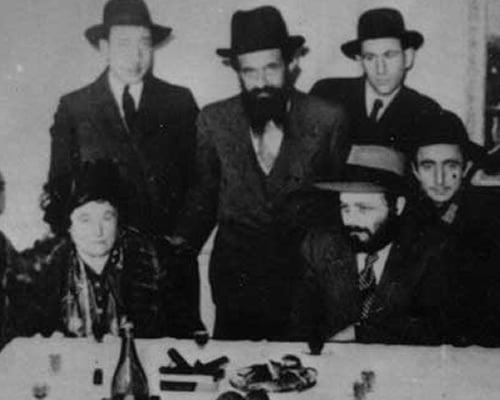
One day, on an afternoon in the month of Cheshvan, a young man entered our home. He ascended the steps, walked into our apartment, and went straight to the dining room. He asked no one for directions; it was as if he knew the house well …
… he proceeded to state that he wished to convey regards from “Levik Zalmanovitch.” It is impossible to express in writing the feelings that I experienced at that moment….
He continued: “Your husband gave me an exact description of your home so that I would not need to ask anyone for directions, and would go unnoticed. Levik Zalmanovitch was thirty-two days in solitary confinement and on the thirty-third day I was confined to that cell with him.”
He was a Christian, and an engineer, who was released after sixth months of incarceration. Before his release, he promised my husband that as soon as he would return home and change out of his prison uniform, he would bring regards from him. This he did, and immediately came to our home.
He related that he had spent the month of Tishrei together with my husband. “As long as live, I will never forget his Yom Kippur. He wept and cried out loud the entire day, reciting chapters of Psalms by heart until late at night. He didn’t say a single word to me the entire day, and I didn’t have the courage to initiate a conversation.”
Later, when we were already in exile, my husband told me that not having a siddur or machzor on that Yom Kippur, he recited what he remembered by heart—which was enough to keep him occupied for the entire day.
8. First Reunion After Nine Months in Prison
After an hour’s wait, they summoned me to a room in which four men sat, all dressed in military uniform. One of them—the oldest, as I later learned—was in charge of the prisoner deportations from this region. They informed me that my husband had been tried in Moscow and sentenced to five years of exile in Central Asia.
… During our meeting we saw each other through an iron screen. A uniformed, armed prison guard stood close by making sure that we spoke only in Russian.
The change that my husband’s face had undergone over the course of these ten months was beyond words. His first question upon seeing me was: “Thank G‑d that we could see each other. Tell me, how many days Rosh Chodesh does the month of Kislev have this year—two or one? I need to know this in connection with Chanukah.”
The visit lasted for several minutes, over the course of which the guard managed to yell at us three times, “Speak Russian!” My husband was very nervous, and when we said our goodbyes, he tearfully begged for my forgiveness. He thought that he would not survive the journey.
9. A Message From Somewhere
At 1:00 o’clock in the middle of the night, there was a knock at my window (we no longer had a bell at our door). It was a telegram delivery, informing me that my husband had arrived at his destination.
Normally there was no mail delivery at night. But the postal workers had realized that the telegram had news about the Rav, and all of them were interested. One of the workers, a Jewish girl, volunteered to take care to bring me the telegram in the middle of the night.
We began examining the telegram to find out from where it had been sent, so that we could try to discover the location of the village where my husband was now staying.
10. Joining Her Husband in the Swamps
Traversing the two kilometers of sticky mud was extremely difficult; walking through the mire was very arduous. Nevertheless, we all arrived without mishap….
Our room was in the home of a Tatar family, which consisted of a husband and wife and their young child, a boy. To get to our room, we had to pass through a hallway wet with mud and dark due to swarms of flies. From there we had to pass through the couple’s bedroom and dining room.
I started a fire with small pieces of wood I gathered, and took out a kettle to boil some tea. Before drinking hot water, we had to wait for the water to settle and the sediment to fall to the bottom of the glass. In time we got used to it, but the first time it made a most unpleasant impression.
As we drank the tea, the non-Jewish wife and her child sat close by, there being no door between our room and theirs. Still, the two of us had much to discuss after such a hard year.
11. Yom Kippur in a Mud Hut
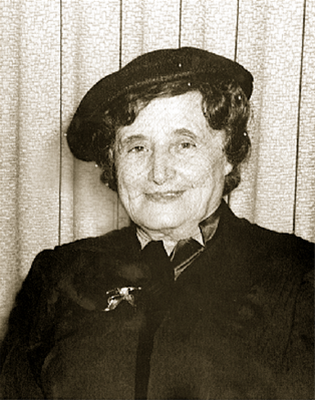
In the middle of our prayers, we noticed a young man trying to look through our window (although it was so well draped by a curtain that nothing was visible outside). We were frightened he might be a spy, and our guest was afraid to let him in. But my husband, of blessed memory, unlocked the door and invited him in.
It was a young Jewish deportee from Lithuania. He had no idea what had happened to his parents. He had been drafted here by the authorities for forced labor. A week earlier, while riding with his horse and wagon, he had noticed my husband, and “saw something special on his face.” He immediately decided to find out where he lived, so that he could “weep next to him on Yom Kippur.”…
Half an hour later, a frightened Jewish woman showed up. She had fled from Nikolayev with her husband, and living now just four kilometers from our village, had learned that we were living there.
Her husband had declared that if G‑d can so mistreat Jews, he had no desire to pray. But his wife insisted she now wanted to pray more than ever before in her life. She was fasting and had walked the four-kilometer distance, but was afraid to ask for our address, because visiting a rabbi, especially a deportee, required utmost caution.
Observing this gathering of Jews praying under such circumstances, each with a bitterly broken heart, I don’t know what else could evoke similar anguish.
12. Celebrating Freedom in Exile
A four-hour journey from us lived a group of Jewish deportees from Kiev in close proximity to each other. … During the two days I spent there, I had a tin-plate pail made for me from new materials. Then I ordered meat and fish, requesting that they be delivered the day before Passover.
… I was filled with inestimable joy at these successes; especially by the new tin pail, which sparkled!
Meanwhile, life went on.
I even invited a guest for Passover. The dishes I had brought from home were still clean. We put together a makeshift table from some boards, over which I spread a white tablecloth. The Kazakh who delivered the chicken and fish on the day before Yom Tov couldn’t stop talking about the “wealth” he saw in our home! Parenthetically, in the course of his four-hour trip, the chicken and fish spoiled from the heat, and became too dangerous to eat.
Thus the three of us sat down to conduct the Passover Seder.
Outside our windows stood a group of young gentiles mocking us, imitating what they referred to as our “wailing.” Inside, however, we loudly and wholeheartedly chanted [the words of Kiddush] “the Season of Our Freedom… You have given us Your holy Festivals, in joy and gladness, as a heritage.” These words felt so real, as well; considering that my husband had spent the previous Passover in prison, this year was certainly an improvement.
13. Starvation
The provisions I had brought were running low. The problem of where to get food became pressing.
Even today, when I am, thank G‑d, a hundred-percent sated, I still recall the pangs of hunger I experienced then. We wouldn’t talk about it but would glance anxiously at the now empty containers which had held our food. Most alarming was our lack of bread. I recall how we didn’t even see any bread throughout the entire month of May.
Our landlady was employed by privileged officials who had more bread than they needed. They gave her the extra bread, and when she came home, she gathered all her goats and pigs and her two dogs, and threw them morsels of bread.
As I recall that now, I am pleased by the self-control I mustered by not asking her to give me a piece of bread as well. I clearly remember how I would squeeze my hands together, trembling a little from hunger, while realizing how, for my husband, this actually represented a continuation of the year of hunger he had already suffered during his imprisonment. I have seen people who were once wealthy who became so impoverished that they came to the point where they actually begged for bread, may G‑d protect us from such wretched depths.
14. Providing Heat in the Winter
The weather turned extremely cold, and it even snowed, which was unusual there. The gentile residents reported that they had not experienced such cold weather for the past thirty years. They blamed it on the Jewish evacuees—“The Jews brought the bad weather!”
The houses in the area were not constructed to accommodate heating, and had no furnaces to heat the rooms. The walls were built of clay, “asman” in Kazakh. In the summer, it isn’t so bad. But in the winter, everything gets damp. In the morning, when you have to put on shoes or the “volenkes” worn there, they were always wet. It was so unpleasant, until the moisture dried up and the feet got a chance to warm up. Often the walls there were mildewed.
I found a Jewish furnace-builder, who started building a sort of furnace in the middle of our room, which we could use for cooking and baking and, at the “same time”—as they say here—would also heat our room. But he had no bricks and couldn’t obtain them elsewhere, as none were available for sale. Mind you, I managed to find more than one hundred odd bricks, and resourcefully gathered them and brought them home. Thank G‑d, we had the furnace completed.
15. The Rebbetzin Falls Ill
My fever continued, and the doctor, despite his great fear, continued his clandestine visits at 1:00-2:00 past midnight. After the doctor left, my husband would take his book of Tehillim, which I still have, and say, “Now I’ll practice some ‘medicine’…”
… In this difficult atmosphere and within the gratifying “comforts” of our dwelling, together with the fact that I was lying sick in bed, without anyone knowing what my illness actually was, my husband settled down next to the table and recited Psalms. The tears poured from his eyes in “rivers.” As I lay in bed, I could sense in his voice how heartbroken he was—his broken heart could have moved boulders. I believed then with perfect faith, as I believe now, that his recital of Psalms helped me recover from my sickness.
16. Arranging a Jewish Burial
The hospital was five kilometers from our home. Once, while visiting the patient, my husband observed that his condition was very serious. … A few days later, the doctor reported that the patient had passed away. This created a problem of how to give him a Jewish burial, for there was no Jewish cemetery there.
… Then, with full knowledge that every step he took was being watched, my husband went to the telegraph office and sent a telegram to the Kzyl-Orda Jewish community requesting that they send a representative, and specifying why. He signed his first name only, without his family name.
… When they arrived, they came to our home, and sat down on the floor, as was their custom, to eat the food they had brought. Then they requested instructions about what to do.
First they went to the hospital to see whether the doctor had kept his word and not allowed the body to be buried with non-Jews. The doctor replied, “I made a promise to Schneerson, and as difficult as it may be, I will not do otherwise.”
Read the funeral account and also about a secret Jew with Christian papers
17. Shabbat Spice
Somehow we managed to get by each week, obtaining food through various means.
When Friday would come around, and there were no Shabbat candles, or when it was often necessary to queue up on line until quite late before Shabbat to receive “the bread of suffering” to use for the “double loaves of bread” [required on Shabbat], it always adversely affected my husband’s mood on the Shabbat. As I left home to go to the bread line, he would say to me emotionally, “G‑d has given us a fragrant spice called Shabbat—we need to prepare ourselves for the Shabbat!”
18. Hamantaschen and Guests
The festival of Purim arrived. We had a Megillat Esther, which I had once included in a food package I had sent my husband.
For Purim we were visited by two evacuees, a young Jewish man, inclined towards Communism, and his female neighbor, an engineer who had once studied Yiddish and was interested in Judaism.
Sometime before, I had set aside some white flour, with which I baked two hamantaschen. Although it’s a minor custom, it played an important role in our lives, reminding us that we were still human and still Jews, and that not every day was the same. We were reminded that we could be concerned with loftier concepts—not just with thinking about our daily bread, and drawing the pail of water from the well and hauling it through the mud, always spilling some and making the already swampy ground even muddier.
The two guests were our company for Purim. They regarded hamantaschen as an excessive extravagance and, as was prevalent in that culture, inveighed against the “old-fashioned” customs.
19. Youth Become Attached to the Rabbi
By day and quite late into the night, our home was full of older Jews. Those that had children brought their sons along. But strict steps were taken to prevent my husband from exerting influence on young people, particularly children, and to keep them from spending time in his company.
Nevertheless, the youth did enjoy his company, listening to his every word with great interest. In addition to several boys who had received a Torah education, there were also three boys from Leningrad who had been evacuated to Alma-Ata, where they attended the Soviet school. Although they had received a one hundred percent anti-religious education, they became deeply attached to my husband. As a result, they demanded that their mother keep kosher, and they refused to eat any food prepared at home. This was no simple matter, because the government food ration included non-kosher meat, and the like.
These three students became Shabbat-observant, and didn’t write at school on that day. This affected their studies, particularly their exams. On Shabbat morning, they went to school to be registered as having attended, and then regularly left for the beit hamidrash [shul] to be with the Rav, staying there all day.
20. Everyone Wanted to Know the Rav
In Alma-Ata, close to where we now lived, a large community of Jews had formed. In a house rented from a Kazakh, they held a minyan for prayer. On Shabbat and during the week, only older Jews usually attended. On Festivals and any Shabbat that coincided with some Soviet national holiday—such as the anniversary of the October Revolution, May 1 or similar new holidays—young people, too, stole into shul to pray.
The congregants included both non-Chasidim and Lubavitcher Chasidim. Unfortunately, disagreements arose between ….
… Before our arrival, those working on my husband’s coming tried hard to ensure that it remain a secret to the other camp. But on his first Shabbat there, the non-Chasidic congregants saw him in shul and made his acquaintance. Some of them held Torah-scholars in great esteem. They complained, “We’ve heard about Schneerson and are interested in knowing him. Why is this group [the Chasidim] monopolizing him and preventing others from approaching him?”





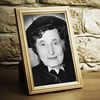

Join the Discussion